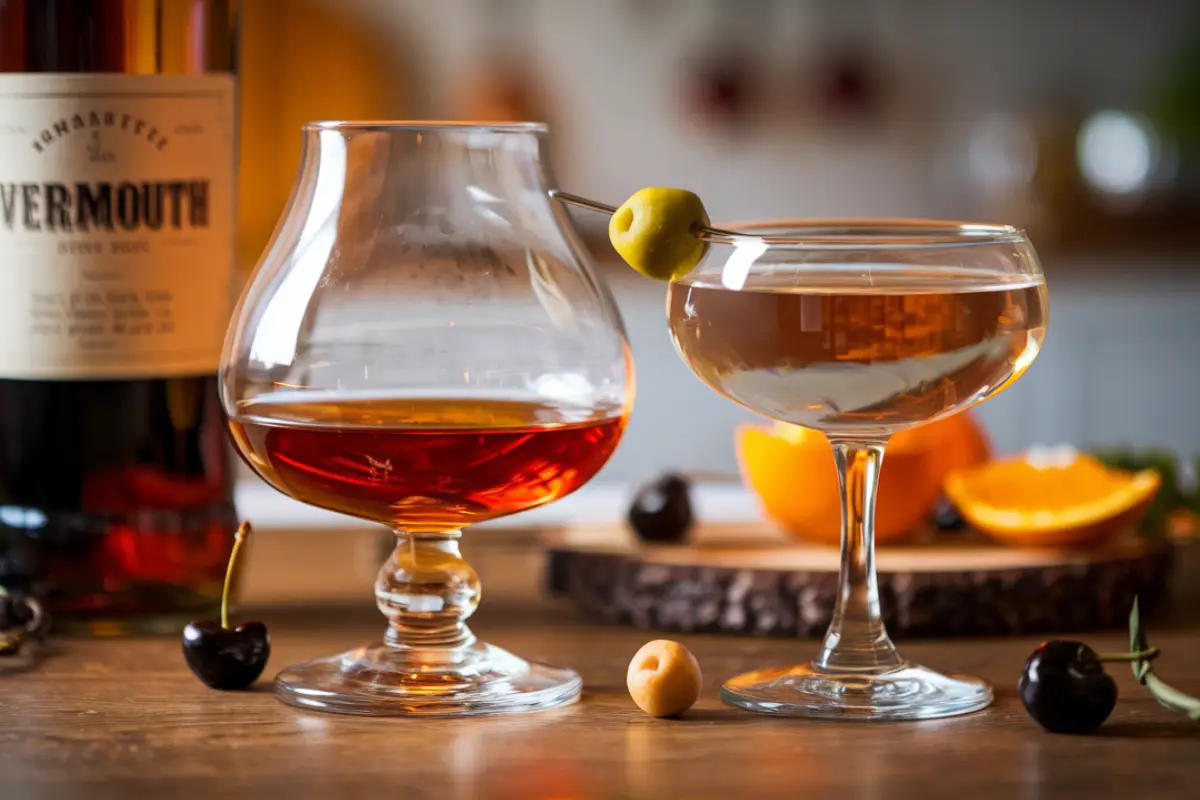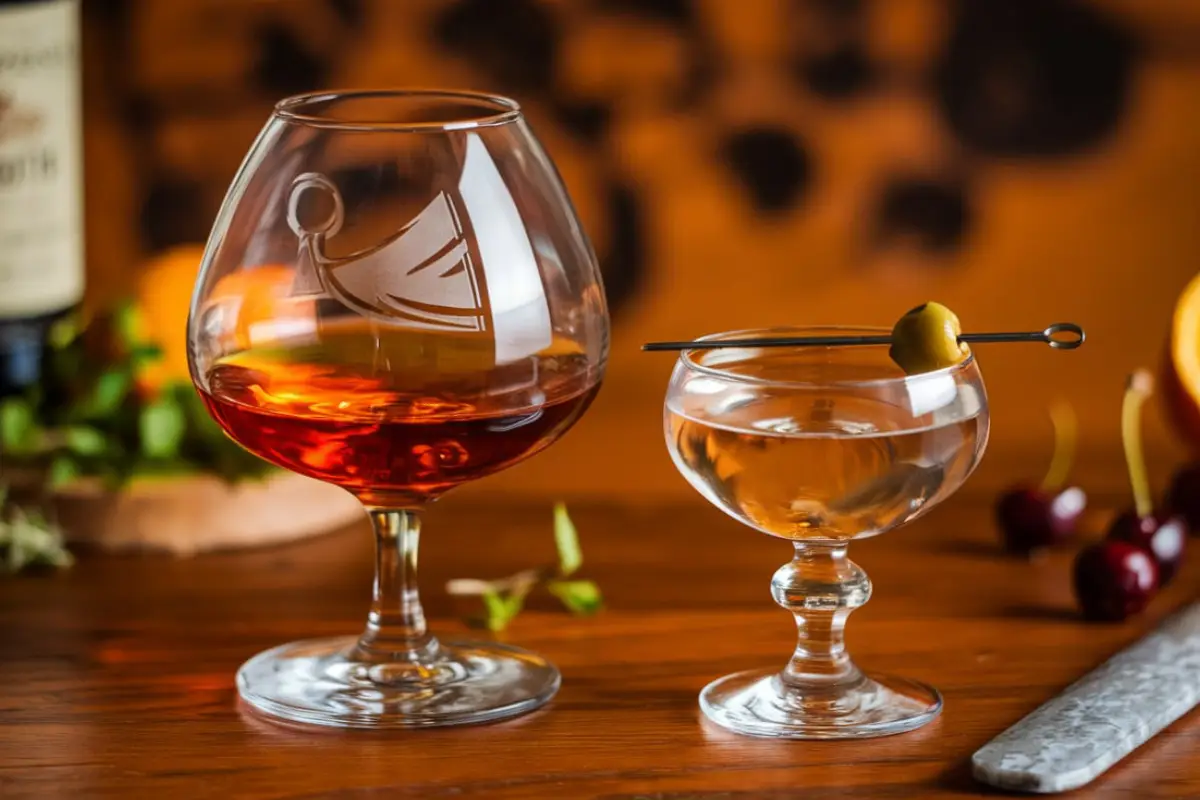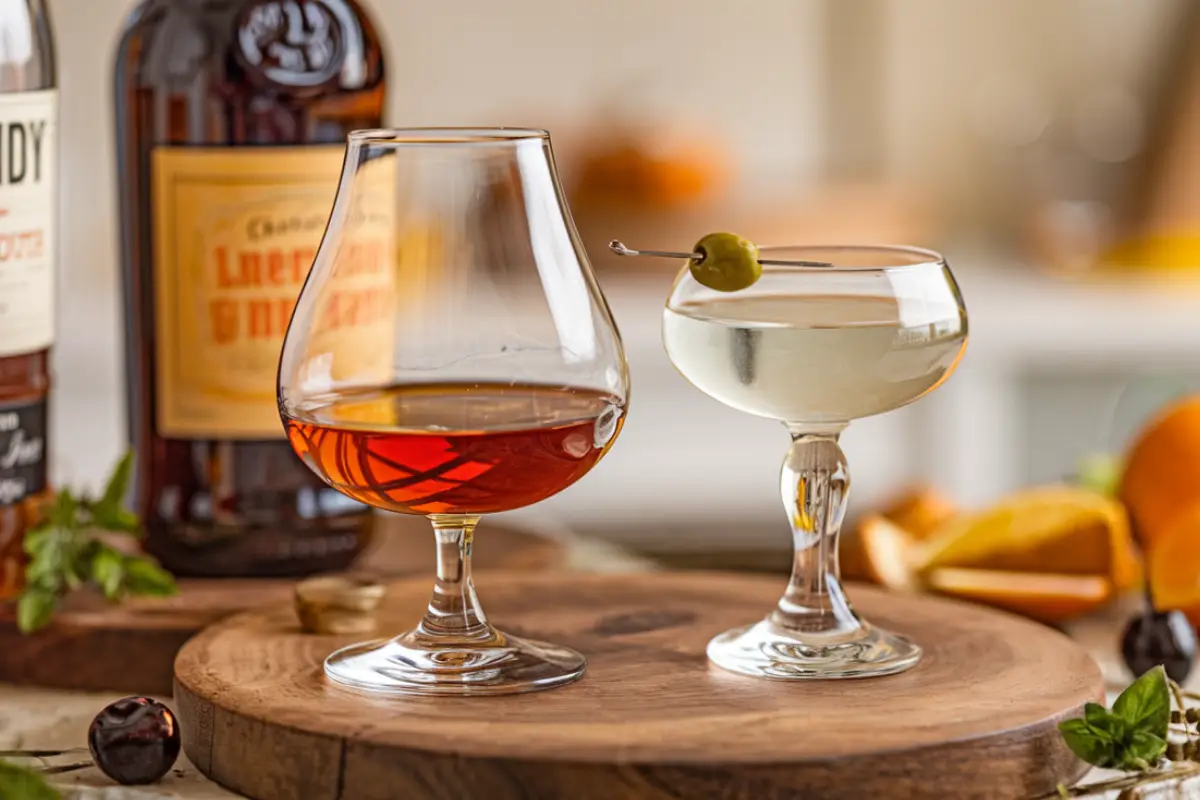Is Brandy the Same as Vermouth?
When exploring the world of alcoholic beverages, two names that often surface are brandy and vermouth. Despite their frequent association in cocktail recipes and bars, many people wonder: Is brandy the same as vermouth? While both can be integral to a great cocktail or enjoyed on their own, they differ significantly in production, flavor, and use. This article will provide a comprehensive exploration of these differences and similarities.
What is Brandy?
Brandy is a distilled spirit that comes from fermented fruit juice, predominantly grapes. The name originates from the Dutch word “brandewijn,” meaning “burned wine,” reflecting its production method, which involves distillation. The distillation process concentrates the alcohol and enhances the flavor of the fruit used, resulting in a spirit that makers typically age in wooden casks, adding further complexity and depth.
Types of Brandy
Several types of brandy exist, each with unique characteristics based on their region of origin and the fruits used in their production:
- Cognac: Producers make this type of brandy exclusively in the Cognac region of France, known for its refined and smooth taste. Distillers use copper pot stills to distill Cognac twice and age it in French oak barrels, which give it its distinct flavor profile.
- Armagnac: This type of brandy, produced in the Armagnac region of France, offers a more rustic and robust flavor than Cognac. Distillers typically distill it only once and age it in black oak barrels, which impart a more intense and earthy flavor.
- Fruit Brandies: Distillers create these types of brandy from fruits other than grapes, such as apples (Calvados from France), cherries (Kirsch from Germany), and plums (Slivovitz from Central Europe). Each type of fruit brandy delivers a unique taste that reflects the natural flavor of the fruit.
To learn more about different types of brandy, check out this guide to popular brandy types.
What is Vermouth?
In contrast, vermouth is a type of fortified wine. It starts as a base wine, which winemakers then fortify with a distilled spirit—usually brandy—to increase its alcohol content. However, the defining feature of vermouth is its infusion with various botanicals, herbs, and spices. This unique process gives vermouth its distinctive aromatic profile and makes it an essential ingredient in many classic cocktails like the Martini, Manhattan, and Negroni.
Types of Vermouth
Vermouth comes in several varieties, each offering different flavor profiles and uses:
- Sweet Vermouth: Winemakers create sweet vermouth, often red or amber in color, with a rich and slightly sweet taste. It often appears in classic cocktails like the Manhattan or Negroni.
- Dry Vermouth: This type of vermouth, typically white and less sweet, is a staple in cocktails such as the Martini. It offers a lighter, crisper flavor profile.
- Bianco Vermouth: A semi-sweet white vermouth, often enjoyed as an aperitif. It has a balanced sweetness that makes it versatile for various cocktails.
- Regional Varieties: Vermouth di Torino from Italy and Vermut de Reus from Spain offer regional varieties that add further diversity to vermouth’s offerings. Each region brings its unique touch to the botanicals and spices used.
To explore the different types of vermouth further, read this guide to understanding vermouth varieties.
Key Differences in Production
While both brandy and vermouth play significant roles in the beverage world, their production processes differ fundamentally:
- Brandy comes from the distillation of fermented fruit juice. After distillation, producers age the brandy in wooden barrels, which adds complexity and depth to its flavor. The aging process can range from a few years to several decades, significantly influencing the final taste.
- Vermouth begins with a base of wine, which winemakers fortify with a distilled spirit (such as brandy) to increase its alcohol content. They then infuse the wine with a variety of botanicals, herbs, and spices, giving it its distinct flavor. This process makes vermouth a unique type of aromatized wine.
For more details on the differences between fortified wines like vermouth, check out this article on fortified wines.
Differences in Alcohol Content

- Alcohol by Volume (ABV):
- Brandy usually has a higher ABV, ranging from 35% to 60%, due to the distillation process. The aging process can also affect its potency, with longer-aged brandies often having a more intense concentration of flavors.
- Vermouth generally has a lower ABV, around 16% to 18%, as it is primarily a wine fortified with a smaller amount of distilled spirit. The exact ABV can vary depending on the brand and type.
Flavor Profiles and Uses
- Brandy delivers deep, complex flavors. The aging process adds notes of oak, vanilla, caramel, and sometimes floral or fruity undertones, depending on the type of fruit used and the length of aging. People often enjoy brandy neat, in cocktails like the Sidecar or Brandy Alexander, or use it in cooking to add depth to sauces, desserts, and flambé dishes.
- Vermouth offers a more nuanced flavor profile, heavily influenced by the botanicals used. Its flavor ranges from sweet and rich (in sweet vermouth) to dry and herbaceous (in dry vermouth). Vermouth serves a versatile role, enjoyed on its own, over ice, or as a base in many cocktails. It also works well in culinary dishes, adding complexity to stews, sauces, and marinades.
Historical Origins and Development
The historical origins of brandy and vermouth offer fascinating insights into their cultural significance:
- Brandy emerged at least by the 12th century in Europe, where people initially distilled it for medicinal purposes. Over time, brandy became a popular drink, especially in France and Spain. Its production spread throughout Europe, with each region developing unique styles and methods. Today, people worldwide enjoy brandy, and it has become synonymous with luxury and refinement.
- Vermouth originated in the 18th century in Italy and France. Initially created as a medicinal tonic, it contained botanicals believed to have various health benefits. Over time, vermouth transitioned from a medicinal product to a staple in the cocktail world, particularly during the 19th and 20th centuries. Its versatility and unique flavor profile have made it a favorite among bartenders and cocktail enthusiasts.
Cultural Significance and Popularity
Both brandy and vermouth hold unique cultural significance:
- Brandy often symbolizes elegance and sophistication. People enjoy it after meals as a digestif, which some believe aids digestion. In many cultures, brandy represents celebration and special occasions, often reserved for toasts at weddings, anniversaries, and holidays.
- Vermouth garners appreciation for its versatility. In Europe, especially in Spain and Italy, people often drink vermouth as an aperitif, served neat or over ice, sometimes with a twist of citrus or an olive. Its role as a key ingredient in classic cocktails adds to its popularity.
Health Aspects and Benefits
While both brandy and vermouth are alcoholic beverages and should be consumed in moderation, each offers potential health benefits:
- Brandy contains antioxidants, which may help protect against cellular damage. Some studies suggest moderate consumption of brandy can improve heart health by promoting healthy blood flow and reducing bad cholesterol levels. However, excessive consumption can negate these benefits and pose health risks.
- Vermouth, being a wine-based product, also contains antioxidants. The herbs and botanicals used in vermouth may provide additional health benefits, such as aiding digestion and reducing inflammation. Some vermouth varieties, especially those made with bitter botanicals, are traditionally used as digestifs.
Common Misconceptions About Brandy and Vermouth
Several misconceptions about brandy and vermouth often lead to confusion:
- Misconception 1: Brandy and Vermouth Are Interchangeable
Due to their different production methods, ingredients, and flavor profiles, brandy and vermouth are not interchangeable in recipes or cocktails. While both enhance drinks, each brings a unique character and should be used accordingly. - Misconception 2: Vermouth is Always Sweet
While many associate vermouth with sweet, red varieties, there are also dry, white versions that offer a completely different taste experience. Understanding these differences is key to making the most of vermouth in your drinks.
Expert Tips for Choosing Between Brandy and Vermouth
Consider these tips when choosing between brandy and vermouth:
- Intended Use: Are you looking for something to sip neat, mix into a cocktail, or use in cooking? Brandy typically suits sipping neat or mixing in rich cocktails, while vermouth excels in classic cocktails or as a light aperitif.
- Flavor Preference: If you prefer deeper, richer flavors with notes of oak, fruit, and spice, opt for brandy. If you enjoy herbal, aromatic flavors with a hint of sweetness or dryness, choose vermouth.
- Alcohol Content: For a lower-alcohol option, go with vermouth, which generally has a lower ABV compared to brandy.
FAQs Related to Is Brandy the Same as Vermouth?

- Is vermouth a type of brandy?
No, vermouth is a fortified wine, while brandy is a distilled spirit. Vermouth comes from fortified and aromatized wine, whereas brandy originates from distilled fruit juice. - Can you substitute vermouth for brandy in recipes?
Generally, no. Vermouth has a different flavor profile and alcohol content compared to brandy, making it unsuitable as a direct substitute in most recipes. - What is the shelf life of vermouth vs. brandy?
Vermouth should be consumed within a few months after opening, as it can oxidize and lose flavor. Brandy, however, can last for years, even after opening, as it does not spoil like wine. - Is vermouth healthier than brandy?
Vermouth has a lower alcohol content and may offer some health benefits due to its botanical ingredients, but the health impact largely depends on consumption habits. - Are there non-alcoholic alternatives for brandy and vermouth?
Yes, non-alcoholic spirits are available that mimic the flavors of both brandy and vermouth. These provide great options for those looking to enjoy the taste without alcohol.
Conclusion: Is Brandy the Same as Vermouth?
While brandy and vermouth often appear together in the context of cocktails and aperitifs, they differ significantly in ingredients, production methods, and flavors. Understanding these differences can help you appreciate the unique qualities of each and make informed choices when selecting beverages for your next cocktail, meal, or celebration. Whether you prefer the rich, aged flavors of brandy or the aromatic complexity of vermouth, both offer a fascinating journey into the world of fine drinks.

